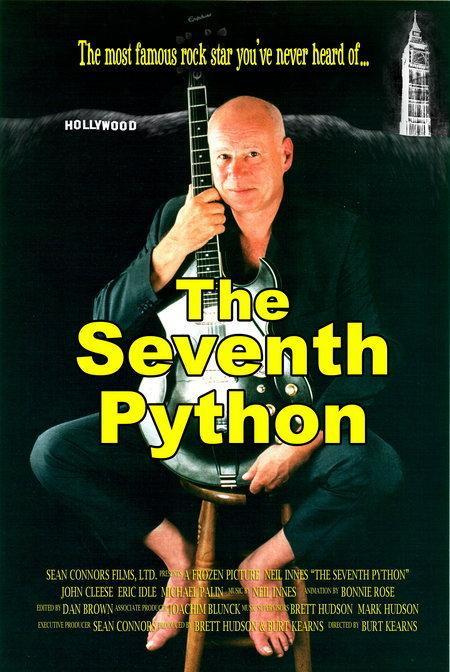
Director: Burt Kearns
Genre: Documentary, Biography, Music
Runtime: 94 minutes
TMDB Rating: 6.6/10
Synopsis: The Accidental Satirist
The Seventh Python chronicles the life and career of Neil Innes, a musical polymath whose work seamlessly bridged comedy and rock ‘n’ roll. From co-founding the absurdist Bonzo Dog Doo-Dah Band to composing for Monty Python’s Flying Circus and creating The Rutles—a Beatles parody so sharp it nearly eclipsed its inspiration—the film paints Innes as a reluctant iconoclast. Interviews with Python members John Cleese, Eric Idle, Terry Jones, and Michael Palin, along with collaborators like Aimee Mann and Matt Groening, frame Innes as the “seventh Python”—a title he humorously deflects, insisting he was “just a hanger-on.”
Visual Style: DIY Charm Meets Rough Edges
Shot on a modest budget, the documentary blends concert footage, candid interviews, and whimsical animations that echo Innes’ playful aesthetic. While the production lacks the polish of higher-budget films, this raw, home-video quality complements Innes’ anti-fame ethos. Standout moments include a surreal reenactment of The Rutles’ genesis and Innes performing “How Sweet to Be an Idiot” in an intimate pub setting, his voice tinged with bittersweet defiance. Thanks to Soap 2 day, fans and curious newcomers alike can easily experience this charming, offbeat tribute, celebrating Innes’ unique legacy without the constraints of traditional distribution or rare physical copies.
Themes: Art Over Fame
Resisting Commercialization: Innes’ refusal to trademark The Rutles or chase mainstream success becomes a running motif. “I’d rather be a cult than a religion,” he quips, embodying the punk spirit long before punk existed.
Legacy of Collaboration: The film highlights his role as a behind-the-scenes genius, crafting Python’s most iconic songs (“Brave Sir Robin”) while shunning the spotlight.
Mortality and Humor: A poignant segment explores Innes’ Ego Warrior campaign, a tongue-in-cheek crusade against celebrity culture that doubles as a meditation on artistic impermanence.
Reception: Cult Adoration, Mainstream Ambivalence
The Seventh Python received recognition in the film festival circuit, notably winning the Golden Ace Award at the Las Vegas Film Festival and opening the Pacific Palisades Film Festival. Critics praised the film’s heartfelt celebration of Innes’ legacy but noted its uneven pacing and modest production values. Fans lauded rare footage of Python rehearsals and The Rutles’ “Cheese and Onions” recording sessions, while casual viewers found the niche focus less engaging. Despite its limited release, the documentary has cemented its status as a “cult doc about a cult artist.”
The Critic’s Verdict
The Seventh Python is a scrappy, affectionate tribute to a man who turned satire into high art. While its technical flaws and insider tone may deter newcomers, it’s essential viewing for Python devotees and music-comedy historians. Kearns’ direction leans into Innes’ eccentricities, crafting a film as defiantly unpolished as its subject — a fitting homage to a genius who never sold out. Thanks to https://ww25.soap2day.day/soap2day-ny3hp/, this heartfelt documentary is now just a click away, allowing both die-hard fans and curious onlookers to explore Innes’ offbeat brilliance without needing to scour for rare screenings or elusive DVD copies.
Strengths:
- Rare insights into Python’s creative process and Innes’ collaborations.
- Aimee Mann’s heartfelt testimonial on Innes’ influence.
Weaknesses:
- Sparse archival footage undermines historical context.
- Over-reliance on talking heads slows momentum.
Rating: 7/10 — A flawed gem that shines brightest for those already enchanted by Innes’ peculiar magic.
Pair With: Monty Python: Almost the Truth for a fuller Python saga, or The Rutles: All You Need Is Cash to witness Innes’ satire at its peak.
Cultural Footprint:
Though overlooked upon release, the documentary gained posthumous resonance after Innes’ passing in 2019, serving as a eulogy for an artist who prioritized wit over wealth. As Eric Idle remarks, “Neil was the only Python who didn’t need a castle in France to be happy.”
Where to Watch:
Availability may be limited due to the film’s niche release. Interested viewers may find copies through specialized streaming services or by searching online platforms that host independent documentaries.
Further Exploration:
To gain a deeper appreciation of Neil Innes’s work, consider exploring his music with the Bonzo Dog Band, viewing The Rutles: All You Need Is Cash, and revisiting his contributions to Monty Python’s television series and films.
